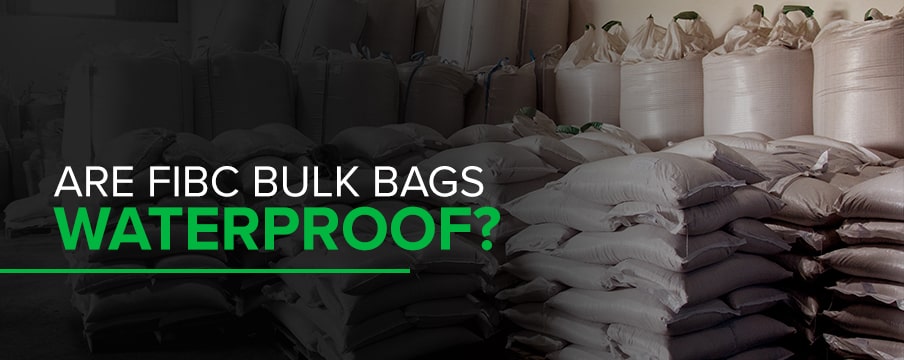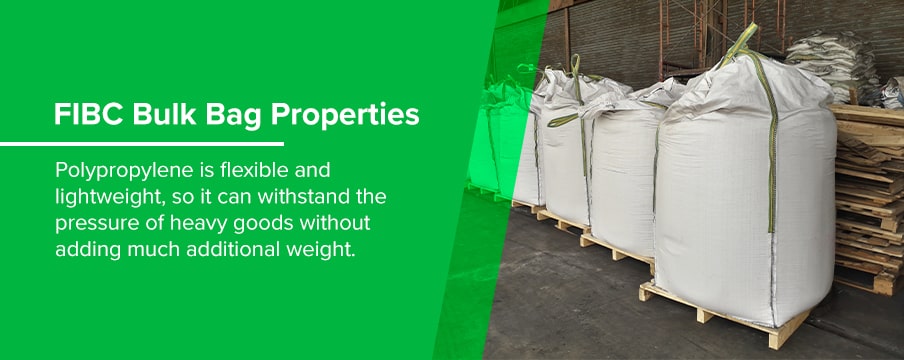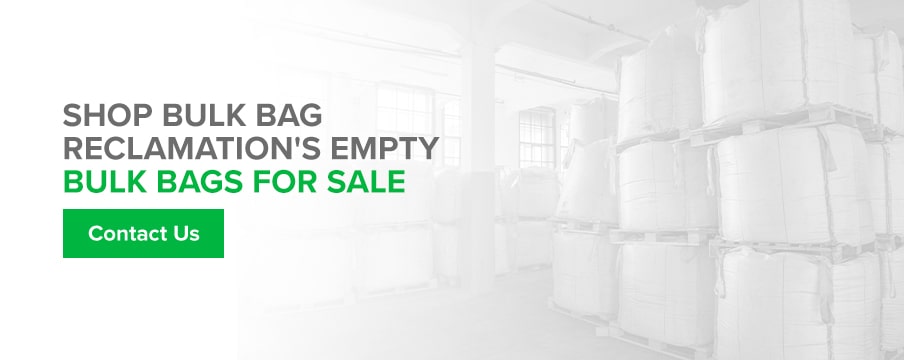Are FIBC Bulk Bags Waterproof?
Flexible intermediate bulk container (FIBC) bulk bags are a versatile solution for storing and transporting large quantities of goods. These bags allow you to securely move and store heavy materials such as grains, construction materials and animal feed.
FIBC bulk bags are usually made of a woven plastic called polypropylene (PP). Plastic textiles allow for bag flexibility while still being strong enough to withstand being filled with rough materials and stacked and moved during industrial processes. FIBC bags come in a variety of designs for maximum product protection and transportation efficiency, whether you’re filling them with grains or using them to remove waste from a construction site.
With many uses for FIBC bulk bags, you may be wondering whether they’re waterproof. Because of the woven nature of the polypropylene, FIBC bags are not waterproof or watertight. But PP woven bags are extremely durable for storing and transporting dry materials, and there are some measures you can take to keep products in these bags protected from moisture.
It’s important to take care of your FIBC bags so they last a long time and you can continue to use them to suit your needs. One of the main ways to keep your bags in good shape is understanding the extent of their water-resistance capabilities and doing what you can to limit moisture exposure.
FIBC Bulk Bag Properties
FIBC bulk bags are made of one or more layers of woven polypropylene strips. Polypropylene is a plastic that’s often spun into fibers and woven together into a fabric. Because FIBC bags are made of this woven material, they are very breathable and not waterproof or watertight.
Woven polypropylene bags have many advantages for storing and transporting dry goods. Polypropylene is flexible and lightweight, so it can withstand the pressure of heavy goods without adding much additional weight. The woven pattern also makes PP a resilient material that keeps its shape while maintaining flexibility.
While you should always try to keep FIBC bulk bags and their contents as dry as possible, there are ways of making these bags slightly more water-resistant. Polypropylene laminate provides an extra plastic layer on the inside or outside of the woven material. Similarly, some FIBC bags have a polyethylene liner that provides an extra level of protection, as well. These layers act as moisture barriers for keeping the bag’s contents dry rather than for actually transporting wet goods or allowing for the bags themselves to get wet.
For these reasons, no FIBC bags are entirely waterproof. Polypropylene and polyethylene liners create limited water-resistance capabilities. But you should always be mindful of where you store these bags, how you transport them and what you fill them with to ensure product quality and bag durability.
PP Used Woven Bag Specifications
The bag reclamation processes give new life to one-time-use bulk bags. The process for these bags involves these steps:
- Thoroughly inspect them for tears or other issues
- Make small repairs if necessary
- Clean any residue
- Secure handles, discharge spouts and other features
Using and Storing FIBC Bags
FIBC bulk bags are optimal for storing and transporting goods in a variety of industries, including:
- Agriculture: Seeds, grain and feed
- Pharmaceuticals: Legal hemp and cannabis
- Construction: Sand, cement, gravel and bricks
- Mining: Coal, metal ores, rock and soil
Woven polypropylene makes versatile bulk containers for a variety of purposes, so no matter what goods you work with, there’s a bag to fit the specifications for those materials:
- Duffle top bulk bags: These bags can fully open and close at the top for easy filling and securing of contents. Duffle top bags are ideal for protecting animal feed or other consumable goods.
- Spout top bulk bags: These bags have a small opening at the top, perfect for easy, mess-free filling. Spout top bags are great for efficiently filling bags with goods like seeds and feed.
- Open top bulk bags: These bags are completely open at the top for easy manual filling and access. The open top and mesh strips around the sides allow for maximum ventilation. Open top bags are ideal for filling bags with irregularly shaped products or for overfilling bags if necessary.
- Baffled bulk bags: These bags are reinforced on the sides so they maintain their square shape even when full. With no bulging or leaning, baffled bags are easy to stack, store and ship and are also ideal for transporting fragile products that need extra protection.
FIBC bags are versatile and strong, providing you with the filling, transportation and storage solutions you need. Even so, it’s important to be aware of best storage practices so you can get the most use out of your bulk bags and keep their contents dry. These bags maintain their strength and durability best under the right conditions.
It’s best to store FIBC bags inside, especially when not actively using them. The UV rays in sunlight can weaken the polypropylene, and, since they aren’t waterproof, these bags are vulnerable to cold, rain and snow. Store your bags in a place where they’ll be out of direct sunlight, not exposed to moisture and covered at all times when not in use to protect against dirt and dust.
If you do need to keep your FIBC bags outdoors for long periods of time, place them in a well-drained area for ease of access and less exposure to moisture. Remember that these bags don’t completely protect against water, and be mindful that their contents might be sensitive to moisture unless stored in a cool, dry place.
Shop Bulk Bag Reclamation’s Empty Bulk Bags for Sale
When used and stored correctly, FIBC bulk bags are extremely durable, able to withstand heavy loads and rough industrial use. For best longevity, store these bags in areas with low moisture and only fill them with dry goods. Check your FIBC bags regularly for holes, tears or other issues.
If you’re looking for bulk bags for construction materials or livestock feed, Bulk Bag Reclamation offers high-quality, safe, refurbished bags designed to meet your needs. When you choose to buy reclaimed bulk bags, you’re choosing a sustainable solution that keeps pre-existing bags out of landfills and puts them back to use. And you receive top-notch FIBC bags at a fraction of the cost of new ones.
To get more information about our variety of FIBC bulk bags, request a quote or call 515-444-7243 today!



